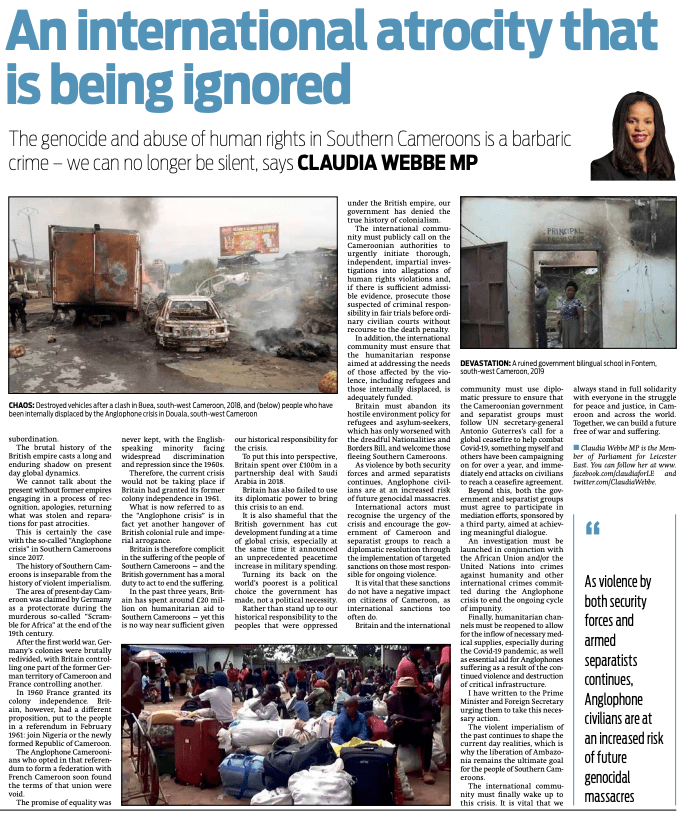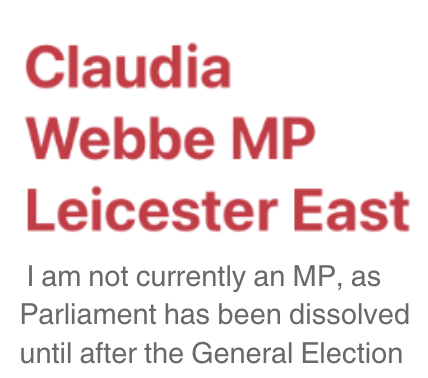
An international atrocity that is being ignored
By Claudia Webbe MP
The genocide and abuse of human rights in Southern Cameroons is a barbaric crime – we can longer be silent, says CLAUDIA WEBBE MP
SADLY, there are so many sites of suffering in the world that some crises do not receive the urgent attention that they deserve.
The genocide and abuse of human rights in the war between separatists and the authoritarian government in Southern Cameroons, also known as Ambazonia, is an international atrocity — yet one that is not nearly discussed enough.
The global community must begin to act on the scale that the crisis demands.
The figures alone are appalling. Since violence began in 2017, 35,000 have been killed. Five hundred villages have been burnt. Over a million children have been deprived of education. More than half a million people have become refugees, with more than 1.5 million people internally displaced. 10,000 people are imprisoned. 5,000 people have been maimed. 10,000 people have been raped. 10,000 women have become widows, and 15,000 children have been orphaned.
This is an intolerable situation. Yet it has also been neglected for too long by the international community.
Genocide Watch has described the situation as an “extermination,” and Human Rights Watch has documented how armed groups and government forces committed widespread human rights abuses, including extrajudicial or summary executions and mass killings.
The government’s continued restrictions on freedom of expression and association have become increasingly intolerant of political dissent.
Political space has been limited as authorities cracked down on opponents of President Paul Biya and his ruling party.
The Covid-19 pandemic has also been used as a pretext to silence the opposition and quell dissent.
Amnesty International reports that fighting between various armed groups and the Cameroonian armed forces has continued unabated for the past three years, with civilians bearing the brunt of unlawful killings, kidnappings and widespread destruction of houses and villages.
Government intervention has been limited, and there has been near-complete silence from the international community.
Armed separatist groups have killed, tortured, assaulted and kidnapped hundreds of people.
They have also prevented humanitarian workers and teachers from doing their jobs, depriving children of access to education.
We must consider the impact of Britain’s colonial legacy on modern-day global insecurity.
Present-day global inequalities remain permanently shaped by the horrors of extractive colonialism and racialised subordination.
The brutal history of the British empire casts a long and enduring shadow on present day global dynamics.
We cannot talk about the present without former empires engaging in a process of recognition, apologies, returning what was stolen and reparations for past atrocities.
This is certainly the case with the so-called “Anglophone crisis” in Southern Cameroons since 2017.
The history of Southern Cameroons is inseparable from the history of violent imperialism.
The area of present-day Cameroon was claimed by Germany as a protectorate during the murderous so-called “Scramble for Africa” at the end of the 19th century.
After the first world war, Germany’s colonies were brutally redivided, with Britain controlling one part of the former German territory of Cameroon and France controlling another.
In 1960 France granted its colony independence. Britain, however, had a different proposition, put to the people in a referendum in February 1961: join Nigeria or the newly formed Republic of Cameroon.
The Anglophone Cameroonians who opted in that referendum to form a federation with French Cameroon soon found the terms of that union were void.
The promise of equality was never kept, with the English-speaking minority facing widespread discrimination and repression since the 1960s.
Therefore, the current crisis would not be taking place if Britain had granted its former colony independence in 1961.
What is now referred to as the “Anglophone crisis” is in fact yet another hangover of British colonial rule and imperial arrogance.
Britain is therefore complicit in the suffering of the people of Southern Cameroons — and the British government has a moral duty to act to end the suffering.
In the past three years, Britain has spent around £20 million on humanitarian aid to Southern Cameroons — yet this is no way near sufficient given our historical responsibility for the crisis.
To put this into perspective, Britain spent over £100m in a partnership deal with Saudi Arabia in 2018.
Britain has also failed to use its diplomatic power to bring this crisis to an end.
It is also shameful that the British government has cut development funding at a time of global crisis, especially at the same time it announced an unprecedented peacetime increase in military spending.
Turning its back on the world’s poorest is a political choice the government has made, not a political necessity.
Rather than stand up to our historical responsibility to the peoples that were oppressed under the British empire, our government has denied the true history of colonialism.
The international community must publicly call on the Cameroonian authorities to urgently initiate thorough, independent, impartial investigations into allegations of human rights violations and, if there is sufficient admissible evidence, prosecute those suspected of criminal responsibility in fair trials before ordinary civilian courts without recourse to the death penalty.
In addition, the international community must ensure that the humanitarian response aimed at addressing the needs of those affected by the violence, including refugees and those internally displaced, is adequately funded.
Britain must abandon its hostile environment policy for refugees and asylum-seekers, which has only worsened with the dreadful Nationalities and Borders Bill, and welcome those fleeing Southern Cameroons.
As violence by both security forces and armed separatists continues, Anglophone civilians are at an increased risk of future genocidal massacres.
International actors must recognise the urgency of the crisis and encourage the government of Cameroon and separatist groups to reach a diplomatic resolution through the implementation of targeted sanctions on those most responsible for ongoing violence.
It is vital that these sanctions do not have a negative impact on citizens of Cameroon, as international sanctions too often do.
Britain and the international community must use diplomatic pressure to ensure that the Cameroonian government and separatist groups must follow UN secretary-general Antonio Guterres’s call for a global ceasefire to help combat Covid-19, something myself and others have been campaigning on for over a year, and immediately end attacks on civilians to reach a ceasefire agreement.
Beyond this, both the government and separatist groups must agree to participate in mediation efforts, sponsored by a third party, aimed at achieving meaningful dialogue.
An investigation must be launched in conjunction with the African Union and/or the United Nations into crimes against humanity and other international crimes committed during the Anglophone crisis to end the ongoing cycle of impunity.
Finally, humanitarian channels must be reopened to allow for the inflow of necessary medical supplies, especially during the Covid-19 pandemic, as well as essential aid for Anglophones suffering as a result of the continued violence and destruction of critical infrastructure.
I have written to the Prime Minister and Foreign Secretary urging them to take this necessary action.
The violent imperialism of the past continues to shape the current-day realities, which is why the liberation of Ambazonia remains the ultimate goal for the people of Southern Cameroons.
The international community must finally wake up to this crisis. It is vital that we always stand in full solidarity with everyone in the struggle for peace and justice, in Cameroon and across the world. Together, we can build a future free of war and suffering.
Claudia Webbe MP is the member of Parliament for Leicester East. You can follow her at www.facebook.com/claudiaforLE and twitter.com/ClaudiaWebbe


